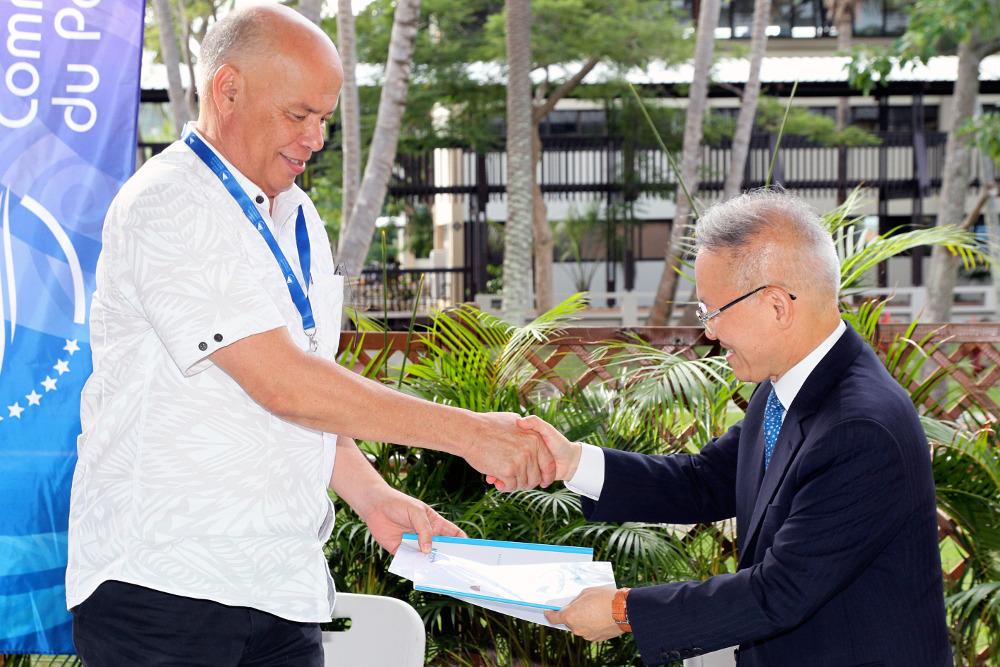Pacific Island countries and territories stand to benefit from the sharing of cutting edge marine scientific and technicalknowledge between the Republic of Korea Institute of Ocean Science and Technology (KIOST) and the Pacific Community (SPC).
The President of KIOST, Dr Gi-Hoon Hong, and the Pacific Community Director-General, Dr Colin Tukuitonga, have today signed a memorandum of understanding in Noumea, New Caledonia.
“SPC welcomes this agreement to promote collaboration with Korea’s main ocean science research institute to support sustainable Pacific development through science and technical innovation,” Dr Tukuitonga said.
“SPC and other scientific organisations are learning more all the time about marine environments, but there’s still much to be discovered, particularly in the Pacific Islands region which spans the world’s largest ocean,” he said.
Under the agreement, KIOST and SPC will cooperate to create, share and apply ocean science, for example through technical meetings, joint lectures, exchange initiatives for experts or students, and by sharing samples or instrumentation.
KIOST undertakes a range of research, including many areas of geoscience, bioscience, physics, environmental research and hazard assessment, and has run a shore laboratory in Chuuk State, Federated States of Micronesia, for several years.
“It’s only natural for our two organisations to form a sisterhood and join forces to solve common challenges by applying the latest science,”Dr Gi-Hoon Hong said.
“We have some exciting projects coming up which we believe can contribute to strengthening science in the Pacific, including the expanded use of our world-first Geostationary Ocean Colour Imaging Satellite, which will cover the entire Pacific as of 2019. Also our new 100-metre research vessel, R/V ISABU, will be conducting expeditions to the Pacific islands region, and as it can accommodate 32 scientific staff, this is one practical example of where we can involve scientists from SPC,” he said.
The four-member KIOST delegation visiting New Caledonia also included the Senior Director of their Marine Environmental Analyses-Remediation Division, Dr Chang Soo Chung; the Leader of their Strategy Development Section, Dr Youn-Ho Lee; and Ungyul Yi from their Strategy Development Section.
The MoU signing took place during the 46th meeting of the Committee of Representatives of Governments and Administrations (CRGA 46) in the presence of some 50 representatives of country and territory members of the Pacific Community and observers, including participants from the European Union and GIZ.
It follows the signing in March 2016 of an agreement between the Korea Research Institute of Ships and Ocean Engineering, the University of South Pacific and SPC to jointly operate a Sustainable Seawater Utilization Academy, with an initial project in Kiribati.
Media contacts:
Jean-Noel Royer, SPC Communications Officer (Noumea) [email protected]
Ungyul Yi, Strategy Development Section, KIOST [email protected]
About the Republic of Korea Institute of Ocean Science and Technology:
KIOST is a state-run institution tasked with discovering new scientific knowledge about the ocean for the benefit of people. To that end, KIOST strives to develop cutting-edge scientific technology and acquire new knowledge in order to discover advanced life, minerals, and energy resources in the ocean and establish future-oriented port city infrastructure, including port and coastal landscapes.
Visit mobile.kiost.ac/kordi_mobile_eng
About the Pacific Community:
The Pacific Community (SPC) is the principal scientific and technical organisation in the Pacific region, supporting development since 1947. It is an international development organisation owned and governed by its 26 country and territory members. Through its Geoscience Division, SPC provides vital applied ocean, island and coastal geoscience services to assist island members to better govern and develop their natural resources, increase their resilience to natural hazards and access data-based approaches to adaptation.
